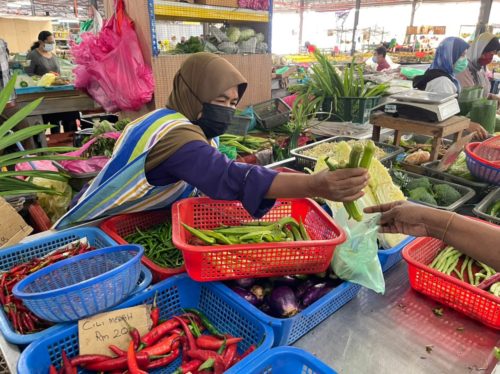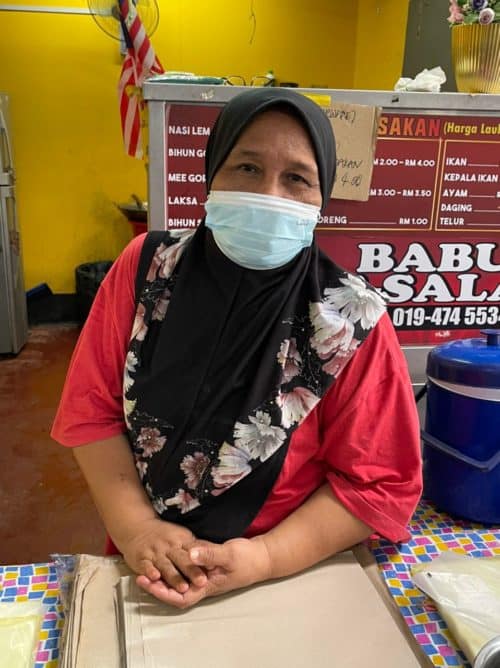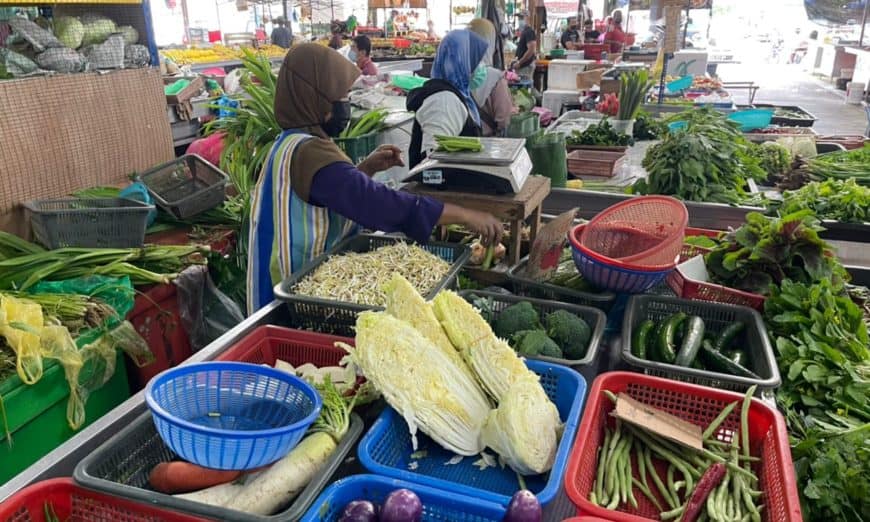THE recent price hike of raw materials has caused a stir among the public, especially the consumers who are still reeling from the Covid-19 pandemic.
Some blame the traders for the hike in raw materials while others blame the authority for failing to take the necessary action to control the price of wet goods.
A survey conducted by Buletin Mutiara today at several wet markets on the mainland found that the increase in the raw materials is between 50% and over 100%, depending on the type of goods.
One consumer, Devaroopan Ravichandran, 48, said the price of wet goods has increased drastically in recent times.

“I noticed the price suddenly skyrocketed when the Federal Government announced the end of lockdown and the reopening of the border for domestic travel.
“For example, the price of chicken is now RM10 per kg compared to the previous price of around RM7 per kg.
“Local beef now costs RM34 per kg, compared to the previous price of about RM28 per kg.
“Thus, I hope that the Federal Government through its responsible ministry will do something about this. At least, please set a ceiling price for these wet goods,” he told Buletin Mutiara when interviewed today.
As for chicken trader Hafizan Halim, 31, he understands the consumers’ complaints about the price hike but said it is unfair to only blame the traders.

“It’s not us who purposely increase the price, but it’s the chicken suppliers. They are the ones who need to be investigated.
“They claim that not only the chicken stock is limited but the price of chicken feed and the cost of transportation have also gone up.
“And when I ordered 500 chickens, they sent me only 200.
“Then, they increased the raw price to RM8.30 per kg from RM6.50 previously based on those reasons.
“So, the increase in chicken prices this time has stressed me because I am caught in between the customers and suppliers.
“Thus, this leaves me with no choice but to increase the price as well. Now, I have to sell at RM9.50 to RM10 per kg,” said Hafizan, who has been in the business for about 10 years.
Meanwhile, for vegetable seller Siti Yah Saad, 59, she also has to increase the vegetable prices as well.

“This is mainly because the wholesaler has increased the prices.
“For instance, I had sold red bird’s eye chili from RM13 to RM15 per kg previously and now I have to raise it to RM20 per kg. Broccoli is now RM20 per kg compared to the old price of RM15 per kg.
“I have no other choices. The reasons given by the wholesaler are due to higher transportation cost and stock limitation. But, I only order from the wholesaler who is based in Penang. Although their excuse is irrelevant, I have no choice but to buy their supplies.
“So, I appeal to the authority to not take action against us only but instead, they should find an alternative solution that can benefit the wholesalers, traders and consumers,” she said.
For restaurant owner Faridah Desa, 58, who has been in the business for more than 20 years, she said this year the price hike for wet goods is the steepest she had ever seen.

“The prices of these two wet goods, namely chicken and vegetables, have been unbelievable.
“Where is the enforcement by the authority? When will they take action to counter this issue?
“As a restaurant owner, I am also affected by this price hike and has to increase the prices as well for our menu.
“Hopefully, the authority will take stern action against those who purposely increase the prices for their own advantage,” she said.
Earlier, Domestic Trade and Consumer Affairs Minister Datuk Seri Alexander Nanta Linggi was reported to say their price increases were due to hikes in operating cost of livestock companies, import costs, fertiliser and pesticide prices.
He had said several action plans were being drawn up involving the three ministries (including the Finance Ministry and Agriculture and Food Industries Ministry) and sincerely hoped that they could be implemented as soon as possible to help consumers and traders who are badly affected.
Story by Riadz Akmal
Pix by Darwina Mohd Daud

